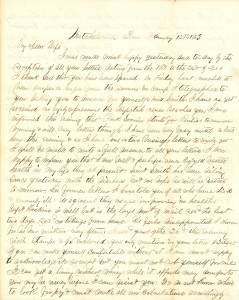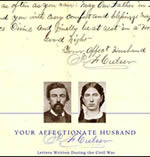 [google-map-v3 width=”400″ height=”300″ zoom=”12″ maptype=”hybrid” mapalign=”right” directionhint=”false” language=”default” poweredby=”false” maptypecontrol=”false” pancontrol=”false” zoomcontrol=”true” scalecontrol=”falso” streetviewcontrol=”false” scrollwheelcontrol=”false” addmarkermashupbubble=”false” addmarkerlist=”36.63234; -86.539994{}1-default.png” bubbleautopan=”true” showbike=”false” showtraffic=”false” showpanoramio=”false”]
[google-map-v3 width=”400″ height=”300″ zoom=”12″ maptype=”hybrid” mapalign=”right” directionhint=”false” language=”default” poweredby=”false” maptypecontrol=”false” pancontrol=”false” zoomcontrol=”true” scalecontrol=”falso” streetviewcontrol=”false” scrollwheelcontrol=”false” addmarkermashupbubble=”false” addmarkerlist=”36.63234; -86.539994{}1-default.png” bubbleautopan=”true” showbike=”false” showtraffic=”false” showpanoramio=”false”]
Mitchellsville, Tenn., January 12th 1863
My dear Wife
I was made most happy yesterday and to-day by the reception of all your letters, dating from the 10th to the 26th of Dec. I thank God that you have been spared. On Friday last, unable to bear suspense longer from the rumors in camp, I telegraphed to you asking you to answer for yourself & Mrs. Smith. I have as yet received no reply & presume the dispatch never reached you. I am informed this evening that Park Loomis starts for Pontiac to-morrow morning & will carry letters through.1 I have been very busy until a late hour this evening, &, as I have one or two business letters to write yet, I shall be unable to write a full answer to all your letters.
I am happy to inform you that I am well & perhaps never enjoyed better health in my life than at present. Lieut. Smith has been ailing since yesterday with the diarrhea, but we hope he will be better to-morrow. In former letters I have told you of all who have died & seriously ill. As a general thing, we are improving in health. Capt. Hoskins is well, but in the large amt. of mail recd. the last two days, recd. no tidings from home. He feels disappointed, I know, for he has written very often.2 I received yours of the 26th this evening with stamps & $5 enclosed.3
You only mention in your letters $2 sent. If you can make yourself comfortable without it, I am most happy to acknowledge its receipt, but you must not rob yourself for me. I can get a living without money, while it affords many comforts. You may be needy before I can assist you. We do not know when to look for pay & must make all our calculations accordingly.
The boots are high priced & I hope good. I do need them very much & almost wish I had not sent, as I could have bought a pair not so cheap but might have used them for some time. They will come good, however, in the muddy spring.4
We have had large accounts of the Small-Pox in Pontiac, and I hope it may soon subside. Fleming in his letter of Dec. 25th writes quite encouragingly, & I hope it may be so. The most important & sure preventative is dieting. Use as little salt as possible & no strong meats, could salt be wholly extracted from the system, there would be no marks left. I have had considerable experience & with equal chances would as soon risk the Small-Pox as the measles. There is no danger if care is taken. I have had varioloid several years ago & with the above precaution suffered but a short time.5 The same teas &c. that drive out measles will apply with the same effect in Small-Pox. But do not expose yourself. Keep out of Town if possible, & may God preserve you & baby from its deleterious effects.
I recd. a letter from Bros. Johny and Leander.6 I should like to answer both to-night but shall not be able. I will do by mail very soon. I presume from the tenor of Bro. Johny’s letter he has joined the Battery ere this. I shall feel grateful for the oysters when they arrive.
We had the honor of a visit today from Col. Smith & wife, Adgt. Plattenburg, Dr. Johns, Capt. Martin, & Lieut. Gilchrist, & had a very pleasant time.7 We were fortunate enough this morning to trade an old axe we had for some eggs, or we would have had a very slim dinner.
You inquire if Bro. Gaff is discharged; he is not. His health is very good, & I understand has been promoted to sergeant. Bro. Lee has not been discharged; I wish he was.8 I fear he will never be quite well. His back has failed him, & he looks quite bad; yet he has great courage & will not complain.
I am not prepared to-night & have not the time to answer your fair proposition with regard to Methodism, but, as you have opened up the way, I will consider myself invited to give my opinion. To say that you need my forgiveness for any act or remark is scarcely fair. I have no recollection of any “unkind words” & certainly never felt that you were in any way erring by clinging to the denomination of your choice. I am not a respector of denominations, &, while I feel more at home in a Methodist Church, God forbid that I should [word omitted] souls for personal prejudice. To say that I should be happy to have you think & feel as I do would not be sufficiently expressed, & I dare not flatter myself that it is wholly so. I would not have you for a moment espouse a doctrine unless you fully endorsed it, but I shall write at length of this shortly. May God abundantly bless and help you in investigating this matter.9
Your letters of 12th gave me much pleasure. I feared that in a careful retrospect of the past, you might long for those pleasant hours of earlier years. If you have been this happy I can scarcely fear aught for the future, for certainly the past year has been rather inauspicious. May God grant us a glorious future.
I shall feel more confident of the prosperity of the S. School with its present corps of officers, without a desire to applaud & do feel unbounded faith in your success if enlisted in the cause. May God help & bless all your efforts. And now, Dear Wife, I have written at far greater length than I intended, but your letters will afford opportunity for several letters. You can use your own judgment about renting the house. I am not at liberty to say anything about “Fisher of Reeds Company.” Please not talk of it to any one.
Give my love to all. Kiss baby for me. I am glad he is so much comfort to me [you?]. Did Mother [Murphy] ever receive my answer to her letter? Remember me kindly to all our friends. I hope you will write each day as you have done. It gives me much pleasure, and now committing all I love most to the kind care of our Heavenly Father, invoking his blessings to rest upon you, I remain as ever,
Your affect. Husband
J. F. Culver
P.S. Mrs. Blackburn has her babe here. Her & Mrs. Fitch both long for an opportunity to get home. They are well.
J.F.C.
- Park Loomis was a 26-year-old Reading clerk and had been employed by the regimental sutler Gagan as his clerk. On Jan. 13, 1863, Loomis was convicted of vending spiritous liquors to the men of the 129th Illinois and was expelled from camp. Loomis, on Feb. 11, formally apologized to Colonel Smith for his misconduct, and the colonel revoked the expulsion order and permitted him to return to and remain in camp, subject to all military rules and regulations. SO 16, Jan. 16, 1863, Regimental Papers, 129th Illinois, NA. [↩]
- Earlier Mrs. Hoskins had complained to Mary Culver that her husband wrote infrequently. [↩]
- Mary Culver’s letter of Dec. 26 is missing from the Culver Collection. On the 27th she wrote, “In my letter of yesterday, I enclosed one dollar’s worth of Postage stamps and a five dollar bill.” Mary Culver to J.F.C., Dec. 27, 1862, Culver Collection. [↩]
- As the local bootmaker had declared that he could not make the boots in less than two weeks, Mary Culver had ordered them from Chicago. Mary Culver to J.F.C., Dec. 3, 1862, Culver Collection. [↩]
- Varioloid is a mild form of small pox. Among Civil War soldiers, especially those from rural areas, measles had a high mortality rate. [↩]
- Johnny Murphy, a sergeant in Company M, 1st Illinois Light Artillery, was Mrs. Culver’s brother, while Leander Utley was married to her sister Margaret. [↩]
- Henry C. Johns, a 43-year-old physician, was commissioned surgeon of the 129th Illinois on Nov. 18, 1862, and ordered to report to the regiment. Having been found incompetent by a medical board on Dec. 18, 1863, Surgeon Johns resigned his commission on Jan. 19, 1864. George W. Gilchrist, a 37-year-old Dwight farmer, was mustered into service on Sept. 8, 1862, as 1st lieutenant of Company B, 129th Illinois Infantry. On April 29, 1864, Gilchrist was detailed to the Pioneer Brigade, and on Aug. 3, 1864, he was placed in charge of the Third Division Pioneers, XX Army Corps. Lieutenant Gilchrist, on April 24, 1865, was detailed as an aide-de-camp at headquarters, 1st Brigade, Third Division. He was mustered out on June 8, 1865, at Washington, D.C. George W. Martin, a 35-year-old Winchester farmer, was mustered into service Sept. 8, 1862, as captain of Company H, 129th Illinois Infantry. Captain Martin resigned Sept. 13, 1864, because of disabilities brought on by a severe attack of typhoid fever. Compiled Service Records of Union Soldiers, NA. [↩]
- John S. Lee, a 36-year-old blacksmith, was mustered into service Sept. 8, 1862, as a private in Company G, 129th Illinois Infantry. Private Lee was severely wounded in the shoulder at the battle of Peachtree Creek, July 20, 1864, and on his recovery, on Jan. 1, 1865, he was assigned to duty as a blacksmith in the ambulance corps, Third Division, XX Corps. He was mustered out at Washington, D.C, June 8, 1865. Ibid. [↩]
- Mary Culver had been raised a Presbyterian. The letter in which she raised the question regarding Methodism has been lost. [↩]

 Subscribe via RSS
Subscribe via RSS Subscribe via Email
Subscribe via Email